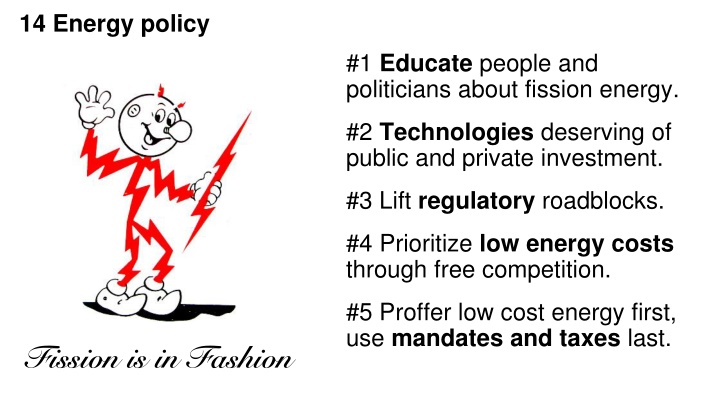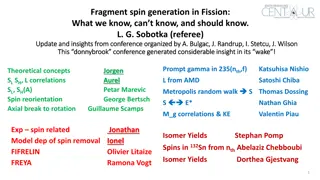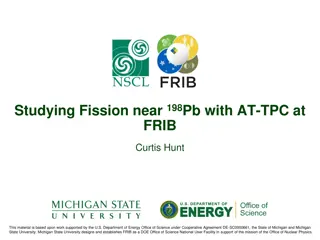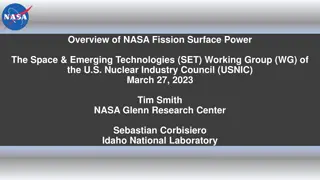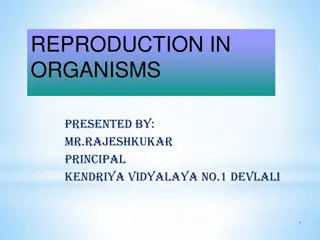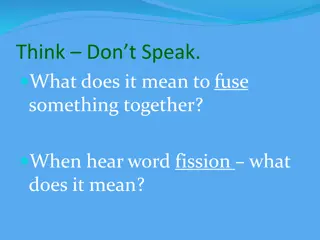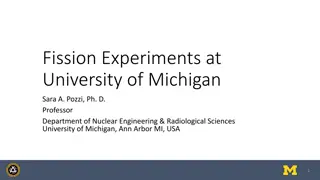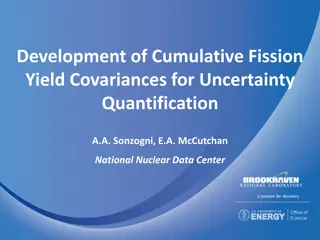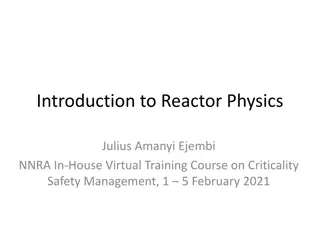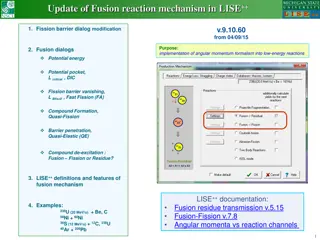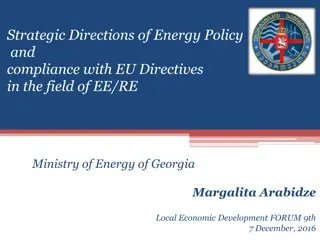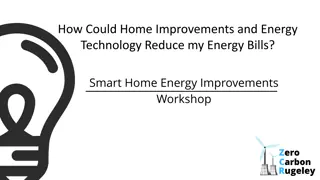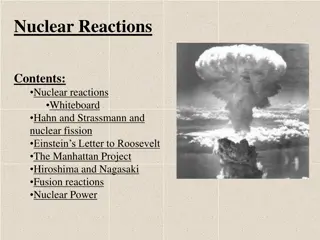Energy Policy and Fission Education
The energy policy recommendations focus on educating people and politicians about fission energy, investing in technologies, addressing regulatory roadblocks, and promoting low-energy costs through competition. Putin's 1997 thesis on Russia's energy policy emphasizes the importance of mineral resources for economic development. The challenges of mandates, such as the Renewable Fuel Standard, are highlighted. The call to make NRC competent in fission, energy, and engineering is also addressed, along with solutions to educate on fission energy misconceptions.
Download Presentation

Please find below an Image/Link to download the presentation.
The content on the website is provided AS IS for your information and personal use only. It may not be sold, licensed, or shared on other websites without obtaining consent from the author.If you encounter any issues during the download, it is possible that the publisher has removed the file from their server.
You are allowed to download the files provided on this website for personal or commercial use, subject to the condition that they are used lawfully. All files are the property of their respective owners.
The content on the website is provided AS IS for your information and personal use only. It may not be sold, licensed, or shared on other websites without obtaining consent from the author.
E N D
Presentation Transcript
14 Energy policy #1 Educate people and politicians about fission energy. #2 Technologies deserving of public and private investment. #3 Lift regulatory roadblocks. #4 Prioritize low energy costs through free competition. #5 Proffer low cost energy first, use mandates and taxes last. Fission is in Fashion
Russia Energy Policy(Putins 1997 economics thesis) 1. Mineral and raw materials represent the most important potential for the economic development of the country. 2. The main reserve for transforming Russia in the relatively near-term future into a leading economic power with a high standard of living for the majority of the population is comprehensive assistance to the development of the national processing industries based upon the extraction industries. 3. The analysis of the economic processes taking place in the world requires comprehensive state support and the creation of large financial-industrial corporations which span several industries on the basis of the resource-extracting enterprises, which could compete as equals with the transnational corporations of the West. 4. The development of the extracting complex should be regulated by the state using purely market methods; moreover the state must assist the development of processing industries based upon the extraction industries in every way. https://www.theatlantic.com/daily-dish/archive/2008/08/putins-thesis-raw-text/212739/
Mandate carefully. Mandates often don't work; for example: Renewable Fuel Standard EIA reports: "About 10 million gallons of cellulosic ethanol was used to comply with the RFS in 2017, about half of which was produced domestically. A 2014 final rule expanded EPA s definition of cellulosic biofuel to include certain types of biogas." US Congress mandated cellulosic ethanol: 5.5 billion gallons (2017) https://www.agmrc.org/renewable-energy/renewable-energy-climate-change- report/renewable-energy-climate-change-report/september-2009- newsletter/cellulosic-ethanol-will-the-mandates-be-met https://www.eia.gov/todayinenergy/detail.php?id=37712
Make NRC competent in fission, energy, and engineering. https://www.nrc.gov/about-nrc/organization/commfuncdesc.html
#1 Educate people and politicians about fission energy. Problems 1. Unawareness of costs of intermittent wind/solar/battery energy. 2. Even most French people think their fission power plants emit CO2. 3. Many fear fission power plants might blow up like a bomb. 4. People (even doctors) are taught all radiation is carcinogenic. 5. Pompous advisory organs substitute fear and doubt for evidence and science. Solutions 1. Science education; young people are more open minded. 2. Public communications: ample, cheap, clean energy for health and prosperity. 3. Rebranding as "fission" avoids nuclear weapons mindset. 4. Political leaders endorse fission and blame all who continued the ALARA fraud. 5. Frame fission energy as the feedstock for a clean, prosperous economy.
#2 Technologies deserving of public and private investment. 1. Liquid fission electricity, cheap, 24x7 9. Hydrogen enhanced biofuels 2. Hydrogen electrolysis 10. CO2 from seawater or air to jet fuel 3. Vehicle batteries 11.High speed trains, public transportation 4. Fuel cells, SOEC/SOFC 12.Buildings, codes, cooling, heating 5. Ammonia synthesis 13.Iron ore electrolysis, H2 reduction 6. Ammonia combustion engines 14.Cement production, alternatives 7. Hydrogen fueled trucks, buses 15.Shipping 8. Resonant inductive highway charging 16.Building factories with shipyards
#3 Lift regulatory roadblocks. 1. End ALARA/LNT policy, which keeps fission energy costs high. Government agencies now appease activists, accede to politicians, ignore science. 2. Base environmentalprotection on science, not the precautionary principle. 3. Permits take decades and billions. Fund and speed up reviews. 4. Speed up obtaining rights of way for power lines, pipe lines, rail lines. 5. Overhaul fractured responsibility for electric power grid regulation (in US). 6. Limit activist, special-interest intervenor, stakeholder delays.
#4 Prioritize low energy costs through free competition. 1. Sunset all stimulus subsidies. 2. End directive technology preferences. 3. Open competition beyond 'certified' suppliers. 4. End tariffs; enable imports from all international suppliers. 5. Use multiple, diverse suppliers for energy security. 6. Remove selective taxes on assets, revenues, and income.
#5 Proffer low cost energy first, use mandates and taxes last. Imposing global CO2 taxes is not feasible; noncompliance creates economic benefits. Developing nations need energy, have highest, growing CO2 emissions. 1. Deploy liquid fission electricity cheaper than from coal or LNG. - eliminate over 1/3 of energy CO2 emissions, without mandates or taxes. 2. Electrified transportation can be cheaper than petroleum fueled transportation. - eliminate almost 1/3 of energy CO2 emissions, with few mandates or taxes. 3. For buildings, market energy cost savings; support district heating; mandate building codes. 4. Industry. Assist, subsidize, cajole, bully, threaten, tax; then mandate.
14 Energy policy #1 Educate people and politicians about fission energy. #2 Technologies deserving of public and private investment. #3 Lift regulatory roadblocks. #4 Prioritize low energy costs through free competition. #5 Proffer low cost energy first, use mandates and taxes last. Fission is in Fashion
